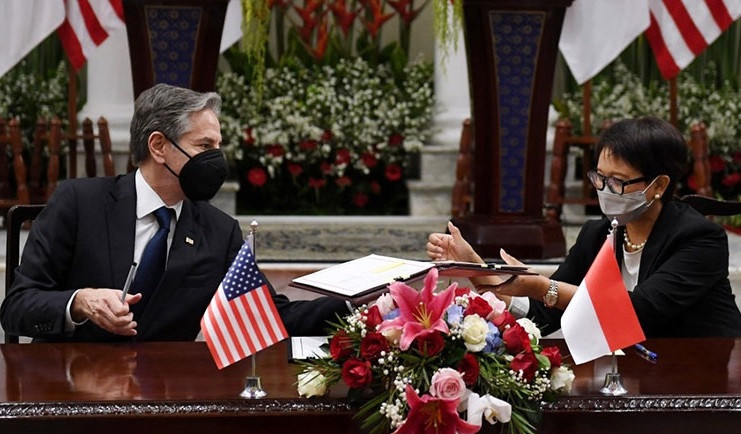Popular Reads
Top Results
Can't find what you're looking for?
View all search resultsPopular Reads
Top Results
Can't find what you're looking for?
View all search resultsFate of G20 meeting rests on Indonesian diplomacy
Analysts say they expect follow-up discussions on President Joko "Jokowi" Widodo's peace mission while also fearing the endeavour could still be disrupted by protests against Russia.
Change text size
Gift Premium Articles
to Anyone

Indonesia will need to sharpen its diplomatic skills for the Group of 20 Foreign Ministers’ Meeting later this week to ensure productivity, experts have said, as 20 top diplomats from around the world descend on Bali to address several geopolitical concerns hindering global recovery efforts.
The Bali meeting is likely to become the first G20 forum to constructively address the war in Ukraine. It will take place a week after President Joko “Jokowi” Widodo’s peace mission to Ukraine and Russia, where he sought to untangle a blockade resulting from a war that has killed thousands of people and disrupted global food supply chains.
Foreign Minister Retno LP Marsudi confirmed recently that the meeting this Friday and Saturday would include her counterparts from all G20 member states, in addition to representatives from 10 non-member countries and 10 international organizations.
Among them is Ukraine, whose Foreign Minister Dmytro Kuleba will address the G20 forum in a prerecorded speech, according to Ukrainian Ambassador to Indonesia Vasyl Haminin on Tuesday.
Meanwhile, G20 member Russia’s top diplomat, Sergei Lavrov, who said late last week that a new “iron curtain” was descending between Russia and the West after Moscow’s offensive in Ukraine, will also participate in the meeting, Reuters reported.
In Bali, over 900 security personnel have been deployed in preparation for the quickly approaching event. Despite a tumultuous beginning infused with boycott threats from countries opposing Russian President Vladimir Putin’s attendance at the November summit, the G20 has made a favorable comeback, with most countries now open to attending the meetings regardless of Russian presence.
British Prime Minister Boris Johnson, for instance, noted that “vacating our seats will leave the arguments to China and Russia”, which riled Beijing. A Chinese Foreign Ministry spokesman responded by saying that the “G20 needs to practice true multilateralism, seek common ground while preserving differences”.
Foreign policy analysts say they are expecting follow-up discussions on Jokowi’s trip to Kyiv and Moscow, as well as any next steps that the international community can take to lower tensions and shield global recovery efforts and other G20 agenda from the excesses of war.
However, there are also concerns that the event could still be disrupted, much like the meeting of G20 central bank governors and finance ministers earlier this year, which saw members of Western states walk out in protest.
Fitriani, an international politics researcher from the Centre for Strategic and International Studies (CSIS), underlined the importance of effective diplomacy on Indonesia’s side, such as dealing with the possibility of a walkout when the Russian minister inevitably issues statements.
She told The Jakarta Post that as the president of the G20, Indonesia must be able to “facilitate solution-based discussions” on the increasing cost of some commodities such as seedlings, fertilizers and fuel prices. That the discussion proceeds productively is paramount, she said, as any sign of negligence could bring on political instability.
Lina Alexandra, the head of the CSIS’ international relations department, elaborated that the host should be prepared with alternative plans to avoid such maneuvers. She said how the meeting unfolds remained “predictable to none”, and that any G20 meeting should ideally try to stay faithful to the agenda set before Russia's invasion of Ukraine.
“The G20 is not a security forum, nor a political forum; it is an economic forum,” she said on Monday. “Jokowi’s visit to Ukraine was not a peace effort, [...] but rather aimed at discussing the restoration of the global supply chain, a topic deeply embedded in Indonesia's interest.”
Prior to his visit to Kyiv and Moscow, Jokowi was in Germany to attend a summit of the Group of Seven, a subset of the G20 comprising industrialized economies. There he spoke about restoring global food supply chains and urged leaders to “honor our duties and start now”.
Retno also said last week that intensive communication and consultation had been made with each and every attending guest amid “the deeply complicated situation now faced by the world”.
“This is the time for us to work together to dedicate our commitments to peace and humanity. The world is waiting for all G20 leaders to present their leadership toward peace, humanity and prosperity,” the minister said.
While important to discuss, the war in Ukraine should not overshadow or become a point of distraction from Indonesia’s three-pronged G20 platform, Lina said, referring to inclusive global health architecture, global digital transformation and sustainable energy transition.
“Indonesia should ideally have a plan at hand to interfere with any maneuvers distracting from the set agenda, which most likely will be taken by the G7 countries. Jokowi most likely communicated this [during his visit],” she said.
“The threat of inflation and a global economic crisis is imminent — which the G20 should play a role in resolving. The global order, especially those relating to the economy, is an incredibly big interest.”










